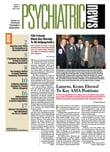We appreciate Dr Spitzer's continuing interest in the development of DSM-V. It seems there may be a misunderstanding concerning the confidentiality of the DSM-V Task Force process. The process does not inhibit colleagues from receiving input or providing feedback on the development of DSM-V. Members of the task force and the work groups have already been openly discussing considerations for major revisions at the APA annual meeting and at diagnostic specialty society meetings.
The development of DSM-V is a time-consuming, expensive, and complicated process designed to ensure the integrity and value of the final DSM-V. The confidentiality agreement allows for scientific input by all task force and work group members without fear of recrimination, and avoids premature conclusions and misconceptions, while critical internal review is still ongoing, that could damage the viability of DSM-V.
The full text of the confidentiality agreement signed by task force and work group participants, partially quoted by Dr. Spitzer, provides for the following:
“I will not, during the term of this appointment or after, divulge, furnish, or make accessible to anyone or use in any way (except as necessary to fulfill the obligations of my appointment) any Confidential Information.” (Emphasis added.)
This allows task force and work group members to discuss DSM-V with their colleagues whenever they feel it is “necessary to fulfill [their] obligations” to develop DSM-V.
The agreement also defines what is not confidential:
“The definition of 'Confidential Information' shall not include any material that the APA publishes or makes publicly available or any material for which the APA grants me written approval to disseminate or publish.”
Accordingly, there is no prohibition on discussion with colleagues if (1) it is needed to develop the DSM-V, (2) the material has been published, or (3) permission is obtained. If a task force or work group member is unsure regarding disclosure, he or she can simply ask.
APA has established a clear precedent for publishing and making publicly available a large volume of material related to the DSM-V process. In fact, the process has already produced substantial results. Since 2002, APA has published six “DSM-V research Agenda” volumes, with another eight in press or in preparation, and more than 80 peer-reviewed papers that provide a scientific basis for considering changes in the DSM diagnostic criteria. There also have been many open discussions with U.S. and international colleagues. Input is also solicited on the<www.dsm5.org> Web site, where information on the development process is continuously updated. Ultimately, every interested party will have an opportunity to comment on DSM-V before it is finalized.
APA has invested a great deal of effort to develop a process allowing appropriate communication while protecting the integrity and value of the DSM-V.
